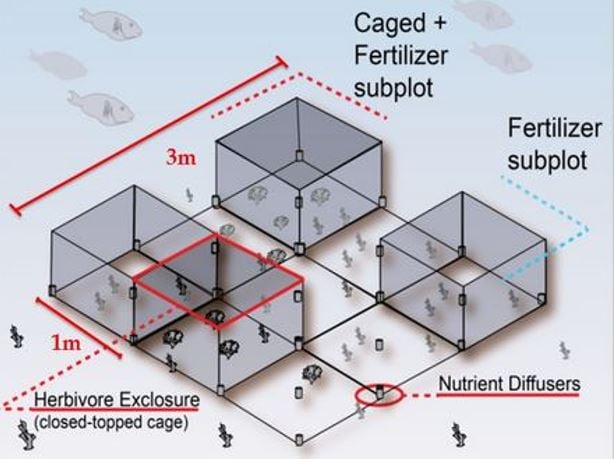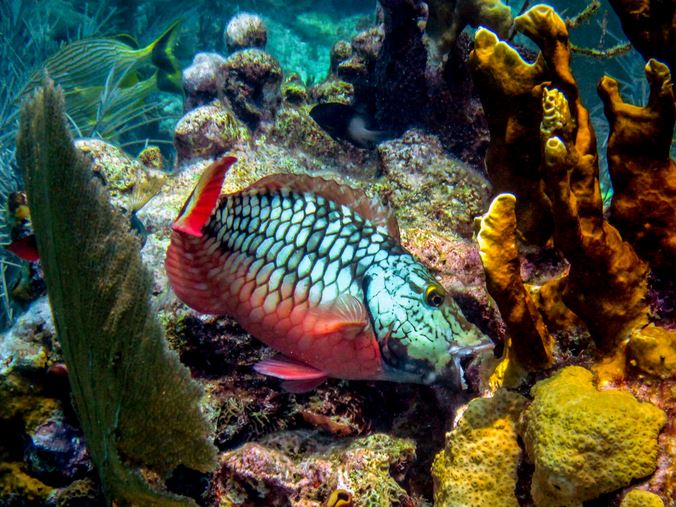Coral reefs globally are declining because of a deadly cocktail consisting of several factors, including pathogenic disease, nutrient pollution and overfishing, says a team of scientists. Add to this the current and predicted future increase in sea temperatures, and the outlook for coral reefs is both alarming and depressing.
Rebecca Vega Thurber, an assistant professor in the College of Science at Oregon State University, together with several scientists from across the USA and one centre in France, explained in the prestigious journal Nature Communications that a combination of forces are significantly weakening corals across the world, and allowing opportunistic pathogens to accumulate to such levels that the corals are unable to survive.
Opportunistic pathogens are harmful microbes – bacteria, viruses, protozoa or fungi – that take advantage of an opportunity that is not normally available to infect a host and make it ill. In this case, the microorganisms are taking advantage of the weakened immune systems of the corals.
 Divers studying corals in controlled experiments near the Florida Keys. (Photo by Cory Fuchs, courtesy of Oregon State University)
Divers studying corals in controlled experiments near the Florida Keys. (Photo by Cory Fuchs, courtesy of Oregon State University)
Three main stressors plus global warming killing corals
The authors said their study was based on one of the largest and longest-lasting field experiments done on this topic. They found that the widespread coral deaths observed over the past few decades are being caused by a combination of several different local stressors, as well as global warming.
The findings follow a 3-year experiment that simulated both nutrient pollution and overfishing on a coral reef in the Florida Keys. The extensive body of field data gathered over a long period helped resolve some of the fundamental questions scientists had been wondering about regarding the cause of coral reef declines, the authors explained.
Co-author, Prof. Thurber said:
“This is grim news, but at least it will help settle the argument over why corals are dying. This makes it clear there’s no single force that’s causing such widespread coral deaths.”
“Loss of fish that help remove algae, or the addition of excess nutrients like those in fertilizers, can cause algal growth on reefs. This changes the normal microbiota of corals to become more pathogenic, and all of these problems reach critical levels as ocean temperatures warm.”
 Samples were taken of the microbiome of corals as part of a three year experiment. (Photo courtesy of Oregon State University)
Samples were taken of the microbiome of corals as part of a three year experiment. (Photo courtesy of Oregon State University)
Coral reef decline ‘catastrophic’
This results in a global decline of coral reefs that today is reaching ‘catastrophic proportions’.
David Garrison, program director in the National Science Foundation’s Division of Ocean Sciences – which paid for the research – said regarding the link between human activities and coral reef survival status:
“We need to know how human activities are affecting coral reef ecosystems. Coral reefs are among the most sensitive indicators of the health of the oceans. This report is a major contribution toward understanding how reefs will fare in the future.”
What they discovered was a depressing picture of mass coral bleaching events which were already underway, plus serious and often deadly problems caused by bacterial infections due to warm temperatures and local stressors – in short, a deadly cocktail that for the corals is literally the kiss of death.
Mass bleaching event rate accelerating rapidly
From the beginning of the last century until the early 1980s, just one mass bleaching event was observed. Compare that to three such events over the past two decades.
If there was one event over an approximately 80-year period, followed by three in just 20 years, how many will there be over the next 20 years, or between now and the end of this century? Will there be any corals left by the year 2100?
Prof. Thurber said:
“About 25-35 percent of the corals on the Great Barrier Reef are dying right now. In 2014-16 large portions of tropical reef across the planet experienced bleaching, and this past April, 90 percent of the Great Barrier Reef bleached as part of a massive El Nino event. Corals everywhere seem to be dying.”
 Experimental design. This was one of the longest studies done on coral declines. (Photo courtesy of Oregon State University)
Experimental design. This was one of the longest studies done on coral declines. (Photo courtesy of Oregon State University)
As well as determining what the effects of known stressors like nutrient pollution and overfishing are, the scientists made one totally unexpected and bizarre finding.
When conditions are healthy for corals, several species including parrotfish, are vital for good coral health. They nibble away at them and remove algae without causing any permanent damage.
However, in one part of the experiment the corals were so weakened by phosphorous and nitrogen pollution that when the parrot fish nibbled at them, sixty-two percent of the corals would perish.
What under normal circumstances would have been healthy fish-coral interaction, had become a deadly one, as far as the coral was concerned.
Co-author, Associate Professor Deron Burkepile, who works at the University of California – Santa Barbara, said:
“Normally benign predation by the parrotfish turned into coral murder. But it’s not the parrotfishes, they’re like the reef janitors, keeping it clean.”
“Those extra nutrients – nutrient pollution – turn parrotfishes into an actual source of mortality by facilitating pathogens in the wounds left by their bites. Excess nutrients turn a coral accomplice into a coral killer.”
 Parrot fish on coral reefs. In some cases, the type of algae control carried out by parrot fish and other marine species poses a danger to unhealthy corals, rather then benefiting them. (Photo by Cory Fuchs, courtesy of Oregon State University)
Parrot fish on coral reefs. In some cases, the type of algae control carried out by parrot fish and other marine species poses a danger to unhealthy corals, rather then benefiting them. (Photo by Cory Fuchs, courtesy of Oregon State University)
Problem is not the parrotfish
The parrotfish are not the problem, the authors emphasized – they are a vital part of healthy reef ecosystems.
Prof. Thurber said:
“The problem is when corals are so weakened they cannot withstand normal impacts. And the solution will be to help those corals recover their health, by ensuring that their local environment is free of nutrient pollution and that fish stocks are not depleted.”
Below are some highlighted study findings:
– Opportunistic pathogens take advantage of corals that have become weakened because of increased sea temperatures, nutrient pollution and overfishing.
– What matters is the sheer abundance of pathogens, rather than what particular type or species they might be.
– Coral reef mortality rates match levels of pathogen concentrations.
Swimming over a dead #coralreef is a sobering feeling of impotence. But we can stop this by beating #climatechange pic.twitter.com/f2y5dcQeFr
— Marco Lambertini (@WWF_DG) June 6, 2016
– Higher sea temperatures exacerbate these problems. Eighty percent of coral deaths occur in the summer or autumn months, but only when fish are removed or nutrient pollution is present.
– While much of the research and media focus has been on high thermal stress, even slight temperature rises make corals more susceptible to bacterial infections.
– When fish populations decline significantly, algal cover can increase six-fold.
– In a distressed system with many algae, coral diseases and mortality increase by a factor of two and eight respectively.
– When algal cover or temperature increase, levels of naturally-secreted antibiotics that help protect corals from harmful bacteria decline.
These latest findings make it clear that in the face of climate change (global warming), some of the best opportunities to save and/or protect coral reefs lie in effective protection of water quality and management of fishing.
This would give corals – sea animals that stay in one place throughout their adult lives – their best chance to have a healthy microbiome and resist water conditions without perishing.
Citation: “Overfishing and nutrient pollution interact with temperature to disrupt coral reefs down to microbial scales,” Jesse R. Zaneveld, Deron E. Burkepile, Andrew A. Shantz, Catharine E. Pritchard, Ryan McMinds, Jérôme P. Payet, Rory Welsh, Adrienne M. S. Correa, Nathan P. Lemoine, Stephanie Rosales, Corinne Fuchs, Jeffrey A. Maynard & Rebecca Vega Thurber. Nature Communications 7, Article number: 11833. DOI: 10.1038/ncomms11833.
Video – Prof. Thurber talks about Coral Reefs
Prof. Thurber talks about the latest study on coral reefs carried out by an international team, and their findings.
